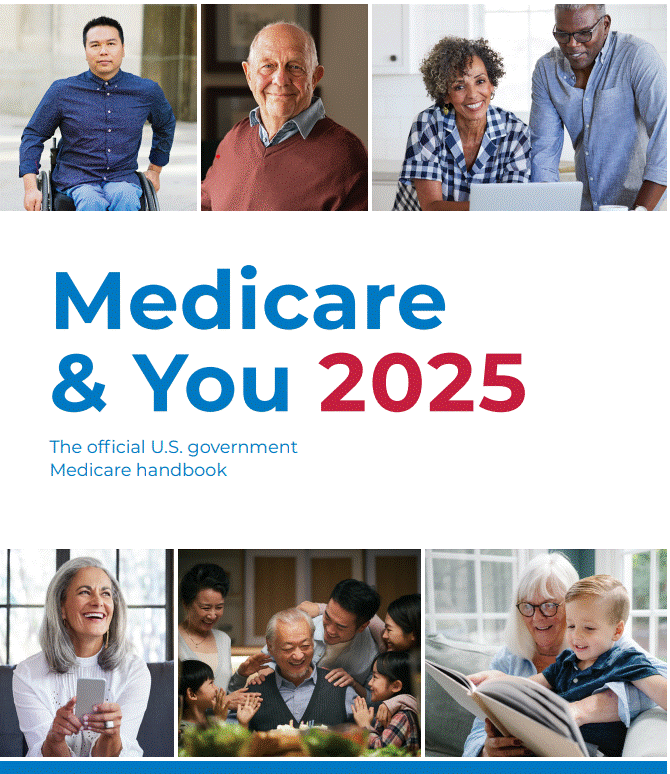Get the New 'Medicare & You' Handbook for 2025
The six ways Medicare will change next year, according to this official Medicare guide.


Profit and prosper with the best of Kiplinger's advice on investing, taxes, retirement, personal finance and much more. Delivered daily. Enter your email in the box and click Sign Me Up.
You are now subscribed
Your newsletter sign-up was successful
Want to add more newsletters?

Delivered daily
Kiplinger Today
Profit and prosper with the best of Kiplinger's advice on investing, taxes, retirement, personal finance and much more delivered daily. Smart money moves start here.

Sent five days a week
Kiplinger A Step Ahead
Get practical help to make better financial decisions in your everyday life, from spending to savings on top deals.

Delivered daily
Kiplinger Closing Bell
Get today's biggest financial and investing headlines delivered to your inbox every day the U.S. stock market is open.

Sent twice a week
Kiplinger Adviser Intel
Financial pros across the country share best practices and fresh tactics to preserve and grow your wealth.

Delivered weekly
Kiplinger Tax Tips
Trim your federal and state tax bills with practical tax-planning and tax-cutting strategies.

Sent twice a week
Kiplinger Retirement Tips
Your twice-a-week guide to planning and enjoying a financially secure and richly rewarding retirement

Sent bimonthly.
Kiplinger Adviser Angle
Insights for advisers, wealth managers and other financial professionals.

Sent twice a week
Kiplinger Investing Weekly
Your twice-a-week roundup of promising stocks, funds, companies and industries you should consider, ones you should avoid, and why.

Sent weekly for six weeks
Kiplinger Invest for Retirement
Your step-by-step six-part series on how to invest for retirement, from devising a successful strategy to exactly which investments to choose.
Big changes are coming to Medicare next year, as explained in the new digital version of the "Medicare & You" handbook. This official guide, produced by the Centers for Medicare & Medicaid Services, is a valuable reference for anyone starting or already enrolled in Medicare. The printed handbook will be sent to all Medicare households in late September. You can download a PDF copy here.
This publication has a rundown of Medicare benefits, health and drug plans, your rights and protections and answers to the most frequently asked questions about Medicare.
Here's a preview of how Medicare will change in 2025, included in the "Medicare & You" handbook.
From just $107.88 $24.99 for Kiplinger Personal Finance
Become a smarter, better informed investor. Subscribe from just $107.88 $24.99, plus get up to 4 Special Issues

Sign up for Kiplinger’s Free Newsletters
Profit and prosper with the best of expert advice on investing, taxes, retirement, personal finance and more - straight to your e-mail.
Profit and prosper with the best of expert advice - straight to your e-mail.
Six changes coming to Medicare in 2025
Each year, Medicare calls out upcoming changes on page two of the guide's "What’s new & important?" section. This year, the section features five upcoming changes that will impact your Medicare coverage in 2025. I've included a sixth change that complements the new Part D cap on out-of-pocket expenses.
Here are the six new and important changes coming to Medicare in 2025:
1. Lower prescription drug costs
In 2025, your yearly out-of-pocket drug costs will be capped at $2,000. After you reach this cap, you don’t have to pay a copayment or coinsurance for Part D drugs for the rest of the calendar year.
2. New Medicare prescription payment plan
This new payment option works with your Part D drug coverage to help you manage your out-of-pocket drug costs, by spreading them across the calendar year. If you select this payment option, you’ll continue to pay your plan premium, and each month you’ll get a bill from your health or drug plan to pay for your prescription drugs instead of paying the pharmacy.
3. Changes to telehealth coverage
After December 31, 2024, you must be in an office or medical facility located in a rural area for most telehealth services. However, you can still get certain telehealth services, such as for mental and behavioral health, in your home no matter where you live. You can find a non-exhaustive list of services anyone can receive without being in a rural area on page 51 of your handbook.
4. Mental health and wellbeing
During your yearly “Wellness” visit, your health care provider can use a health risk assessment to better understand your social needs and refer you for appropriate services and support. This is called a “social determinants of health risk assessment,” and it is free as part of the Wellness visit. Medicare also covers expanded mental health care, such as intensive outpatient program services and services from marriage and family therapists and mental health counselors. You can find out more about which types of mental health services are covered and permissible locations to receive the services on page 46 of your handbook.
5. More resources for caregivers
Training. Medicare now covers training that helps your caregiver learn and develop skills to care for you, such as giving medications, as part of your treatment plan. Training must focus on your health goals, and your treatment must require a caregiver’s help to succeed. You pay 20% of the Medicare-approved amount and the Part B deductible applies.
Respite care. Medicare also covers inpatient respite care in a Medicare-approved facility. You can stay for up to 5 days each time you get respite care.
New pilot program for people living with dementia. People living with dementia and their family and unpaid caregivers may be able to get additional support through the Guiding an Improved Dementia Experience Model pilot program. The model began on July 1, 2024, and will run for eight years.
6. Postal Service Health Benefits Program (PSHB)
Starting January 1, 2025, eligible U.S. Postal Service employees, retirees, and their families will get coverage through the Postal Service Health Benefits Program (PSHB) instead of FEHB. If you are an annuitant as of January 1, 2025, and not currently participating in Medicare Part B, you are not required to enroll in Medicare Part B to continue your health insurance coverage in the new PSHB Program. Participation in Medicare Part B is voluntary. If you are an annuitant as of January 1, 2025, and are already enrolled in Medicare Part B, you are required to remain enrolled in Medicare Part B to continue coverage under PSHB.

How much will Medicare cost in 2025?
The handbook does not answer how much Medicare will cost in 2025. The Medicare Part A deductible and Part B and Part D premiums for 2025 will be released closer to the beginning of Medicare Open Enrollment, held annually from October 15 to December 7. The premiums and deductibles are normally released after the Social Security Administration announces the official COLA, which is scheduled for 8:30 am ET on Thursday, October 10.
The Medicare handbook has many formats
There are multiple formats of the "Medicare & You" handbook available for download. Whether English is your second language or if you suffer from impaired vision — you should be able to find one to suit your needs.
A large print edition can be found here, you can access an audio version here and you can download copies in e-book or Mobi formats here. A braille edition can be requested by calling 1-800-MEDICARE (1-800-633-4227) and you can also make the request online through your Medicare.gov account.
Currently, you can download an edition in Chinese, Korean, Spanish and Vietnamese.
Related Content
Profit and prosper with the best of Kiplinger's advice on investing, taxes, retirement, personal finance and much more. Delivered daily. Enter your email in the box and click Sign Me Up.

Donna joined Kiplinger as a personal finance writer in 2023. She spent more than a decade as the contributing editor of J.K.Lasser's Your Income Tax Guide and edited state specific legal treatises at ALM Media. She has shared her expertise as a guest on Bloomberg, CNN, Fox, NPR, CNBC and many other media outlets around the nation. She is a graduate of Brooklyn Law School and the University at Buffalo.
-
 Quiz: Do You Know How to Avoid the "Medigap Trap?"
Quiz: Do You Know How to Avoid the "Medigap Trap?"Quiz Test your basic knowledge of the "Medigap Trap" in our quick quiz.
-
 5 Top Tax-Efficient Mutual Funds for Smarter Investing
5 Top Tax-Efficient Mutual Funds for Smarter InvestingMutual funds are many things, but "tax-friendly" usually isn't one of them. These are the exceptions.
-
 AI Sparks Existential Crisis for Software Stocks
AI Sparks Existential Crisis for Software StocksThe Kiplinger Letter Fears that SaaS subscription software could be rendered obsolete by artificial intelligence make investors jittery.
-
 Quiz: Do You Know How to Avoid the 'Medigap Trap?'
Quiz: Do You Know How to Avoid the 'Medigap Trap?'Quiz Test your basic knowledge of the "Medigap Trap" in our quick quiz.
-
 We Retired at 62 With $6.1 Million. My Wife Wants to Make Large Donations, but I Want to Travel and Buy a Lake House.
We Retired at 62 With $6.1 Million. My Wife Wants to Make Large Donations, but I Want to Travel and Buy a Lake House.We are 62 and finally retired after decades of hard work. I see the lakehouse as an investment in our happiness.
-
 Social Security Break-Even Math Is Helpful, But Don't Let It Dictate When You'll File
Social Security Break-Even Math Is Helpful, But Don't Let It Dictate When You'll FileYour Social Security break-even age tells you how long you'd need to live for delaying to pay off, but shouldn't be the sole basis for deciding when to claim.
-
 I'm a Wealth Adviser Obsessed With Mahjong: Here Are 8 Ways It Can Teach Us How to Manage Our Money
I'm a Wealth Adviser Obsessed With Mahjong: Here Are 8 Ways It Can Teach Us How to Manage Our MoneyThis increasingly popular Chinese game can teach us not only how to help manage our money but also how important it is to connect with other people.
-
 Global Uncertainty Has Investors Running Scared: This Is How Advisers Can Reassure Them
Global Uncertainty Has Investors Running Scared: This Is How Advisers Can Reassure ThemHow can advisers reassure clients nervous about their plans in an increasingly complex and rapidly changing world? This conversational framework provides the key.
-
 5 Ronald Reagan Quotes Retirees Should Live By
5 Ronald Reagan Quotes Retirees Should Live ByThe Nation's 40th President's wit and wisdom can help retirees navigate their financial and personal journey with confidence.
-
 We're 78 and Want to Use Our 2026 RMD to Treat Our Kids and Grandkids to a Vacation. How Should We Approach This?
We're 78 and Want to Use Our 2026 RMD to Treat Our Kids and Grandkids to a Vacation. How Should We Approach This?An extended family vacation can be a fun and bonding experience if planned well. Here are tips from travel experts.
-
 Should You Jump on the Roth Conversion Bandwagon? A Financial Adviser Weighs In
Should You Jump on the Roth Conversion Bandwagon? A Financial Adviser Weighs InRoth conversions are all the rage, but what works well for one household can cause financial strain for another. This is what you should consider before moving ahead.